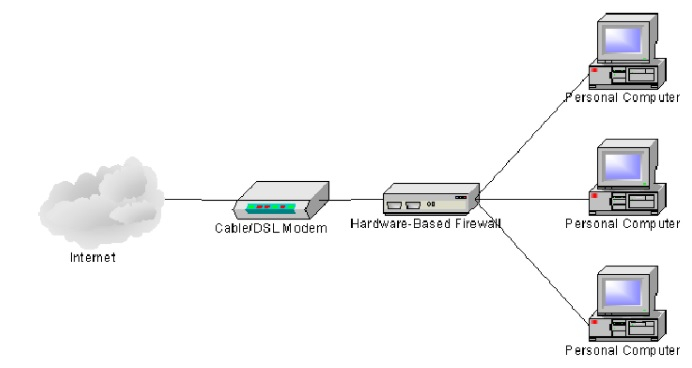
 Data Structure
Data Structure Networking
Networking RDBMS
RDBMS Operating System
Operating System Java
Java MS Excel
MS Excel iOS
iOS HTML
HTML CSS
CSS Android
Android Python
Python C Programming
C Programming C++
C++ C#
C# MongoDB
MongoDB MySQL
MySQL Javascript
Javascript PHP
PHP
- Selected Reading
- UPSC IAS Exams Notes
- Developer's Best Practices
- Questions and Answers
- Effective Resume Writing
- HR Interview Questions
- Computer Glossary
- Who is Who
What is a firewall? What are the advantages of hardware and software firewalls?
Firewall is a wall between a personal computer and the outside world. So it will filter the traffic coming from the outside world based on the user configuration like which sites are trusted sites and which we need to allow.
The diagram given below depicts the firewall:

Functions of firewall
The functions of a firewall in computer networking are as follows −
Block unsafe URLs.
Close down a port completely.
Open a port to only specific IP addresses.
Allow some ip addresses at specific times.
Advantages of Hardware Firewall
The advantages of a hardware firewall are as follows −
Hardware firewalls can protect your entire network with a single firewall.
Hardware firewalls cannot run on your computers so, they cannot affect system performance or speed.
A hardware firewall won't easily be disabled by malicious software, such as software firewalls can be disabled.
Given below is the diagram of a hardware firewall −

Advantages of Software Firewall
The advantages of a software firewall are as follows −
Software firewall can protect your network at a very low cost.
Software firewalls can run on your computers, so they are flexible and connect to the internet.
Software firewall protects the computer by its installation no matter where that computer is connected to the internet or not. Such flexible features are very helpful to protect our system like laptops.
Types of firewalls
There are eight types of firewalls, which are as follows −
Next-gen firewalls
Packet-filtering firewalls
Cloud firewalls
Application-level gateways (a.k.a. proxy firewalls)
Stateful inspection firewalls
Circuit-level gateways
Hardware firewalls
Software firewalls
Security zones in firewall
It is the network segment in which a firewall groups physical and virtual interfaces together to control and log the traffic to and from the network.

